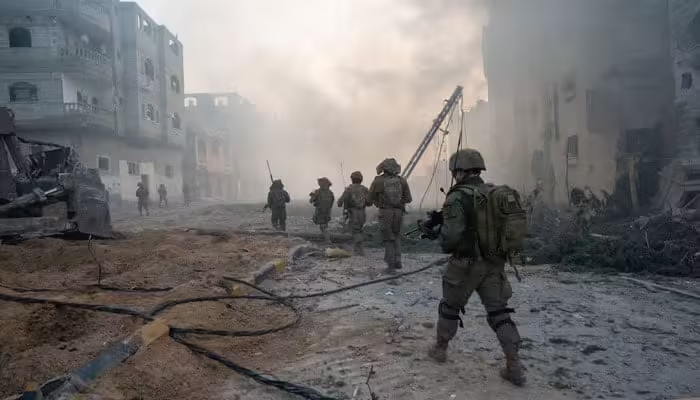In a significant development, international rating agency Standards & Poor’s (S&P) has downgraded Israel’s long-term credit rating, citing escalating security risks due to intensifying tensions with Hezbollah. The downgrade comes amidst growing concerns over the ongoing conflict and its impact on Israel’s economy and the broader region. In its statement, S&P noted that the security situation has worsened, with ground operations expected to continue into 2025, increasing uncertainty and economic challenges.
Rising Security Risks and the Hezbollah Factor
Israel has long faced security threats from Hezbollah, the Lebanon-based militant group backed by Iran. However, the recent escalation in tensions marks a significant shift, with both sides engaging in more aggressive actions. S&P highlighted that the current security risks have reached new levels, necessitating a downgrade of Israel’s credit rating. The agency pointed to Israel’s ongoing military operations and the threat posed by Hezbollah as key factors contributing to the downgrade.
Hezbollah has conducted multiple attacks on Israeli military targets, including a major strike on an Israeli military base following the assassination of its leader, Hassan Nasrallah. In retaliation, Israel launched an attack on Hezbollah’s headquarters, further inflaming the situation. The conflict has not been limited to the Gaza Strip but has extended to Lebanon, where Hezbollah operates. The deteriorating security situation has significantly raised concerns about Israel’s ability to manage the ongoing conflict without further economic and social consequences.
Economic Impact and the Downgrade
The conflict’s implications extend beyond the immediate security threats and have raised alarms about Israel’s economic stability. In its analysis, S&P had initially expected Israel’s economy to show signs of recovery in the coming years. The rating agency predicted a decline in Israel’s GDP growth to 0% in 2024, followed by a modest recovery to 2.2% in 2025. However, these projections were based on the assumption that the security situation would stabilize and that defense spending would remain within manageable limits.
The ongoing conflict, coupled with rising defense expenditures, has upended these expectations. S&P pointed out that the Israeli government’s need to allocate more resources to defense, alongside the growing budget deficit, would strain the country’s economy further. As a result, Israel’s long-term credit rating was downgraded from A+ to a lower grade, reflecting the heightened risks facing the economy. Additionally, the agency maintained a negative outlook for the future, signaling that further downgrades could occur if the conflict continues to escalate or if the economic situation worsens.
The Impact of Ongoing Military Operations
Israel’s military operations, which intensified following the October 7, 2023, attack on Gaza, have been at the center of the current conflict. The Israeli government’s efforts to eliminate threats from Gaza and Lebanon, as well as its attempts to release hostages held by militant groups, have not yet yielded the desired results. Despite heavy airstrikes that have turned much of Gaza into rubble, the hostages remain in captivity, and Israel’s military campaign has faced challenges in achieving its objectives.
The conflict is not limited to Israel’s borders. Hezbollah has capitalized on the situation, launching attacks from Lebanon and complicating Israel’s efforts to focus solely on Gaza. The assassination of Hezbollah’s leader, Hassan Nasrallah, and subsequent retaliation has only deepened the hostilities, with both sides showing no signs of de-escalation.
The situation took another critical turn when Iran, a key supporter of Hezbollah, entered the fray. Iranian forces have launched attacks on Israel, further heightening the security risks and adding another layer of complexity to the conflict. The involvement of Iran raises the possibility of a protracted war, which would have far-reaching effects not just on Israel but on the broader region as well.
Regional Implications of the Conflict
The potential for a prolonged conflict between Israel and Hezbollah, with Iran now in the mix, has significant implications for regional stability. The Middle East has long been a volatile region, and this latest escalation threatens to disrupt the fragile balance of power. A drawn-out war could trigger wider instability, with other countries in the region being drawn into the conflict. The economic repercussions would be felt not just by Israel but by neighboring countries that are already struggling with their own challenges.
The humanitarian impact has also been severe. In addition to the hundreds of casualties in Gaza, thousands of people have been displaced and left homeless due to the ongoing conflict. The international community has expressed concern about the rising toll on civilians, and efforts to broker a ceasefire have so far been unsuccessful.
A Challenging Road Ahead for Israel
Israel’s credit rating downgrade by S&P serves as a stark reminder of the broader implications of the ongoing conflict. The downgrade reflects not only the immediate security risks posed by Hezbollah and other militant groups but also the long-term economic challenges that Israel faces. With ground operations expected to continue into 2025, the situation remains volatile, and the Israeli government will need to balance its security needs with the growing strain on its economy.
The involvement of Hezbollah, and now Iran, has significantly complicated the situation, making it difficult to foresee a swift resolution to the conflict. As the violence continues, Israel’s economic outlook remains uncertain, and the country may face further downgrades if the situation does not stabilize. The coming months will be crucial for determining whether Israel can navigate this challenging period without further economic and security deterioration.
The downgrade by S&P underscores the urgent need for both military and diplomatic efforts to address the conflict and its broader regional implications.



